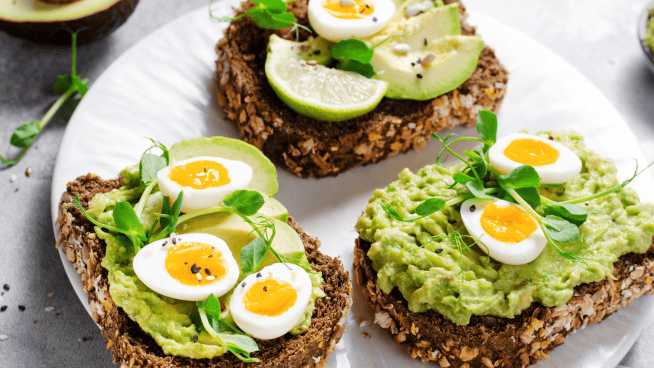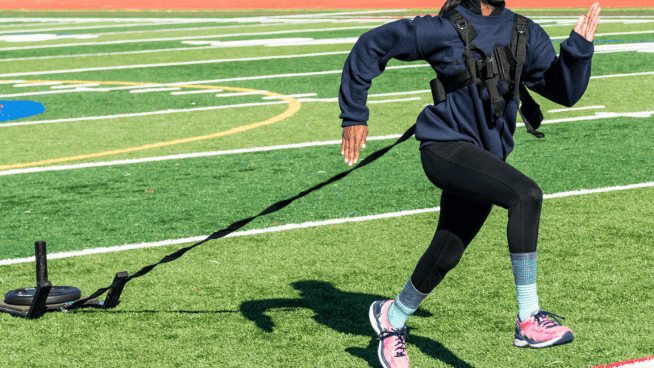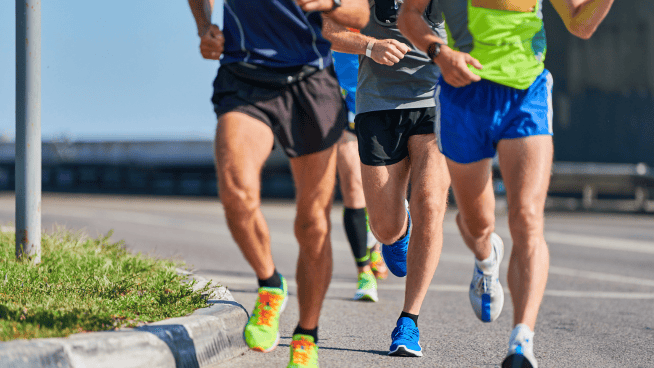The Best Way to Gain Weight With Your Diet
While many Americans labor to shed pounds, lots of athletes are struggling to put on weight. Athletes could want to gain weight for a few reasons, the most likely ones being to increase muscle mass or perform better at their sport. Regardless of the reason, it’s important to gain weight in a healthy way. Processed foods and sugar-stuffed treats provide plenty of calories, but almost no vitamins or minerals. A better approach is to focus on healthy foods that will lead you to gain weight in a safe, smart manner.
RELATED: The Right Way to Gain Weight During the Off-Season
Nutrient Breakdown
Understanding macronutrients is a key to understanding healthy weight gain. Fats, carbohydrates and protein are the three macronutrients. Athletes require more of them than people who don’t exercise. The fats you get from your food are necessary to help you absorb certain vitamins, and they play a role in cell membrane structure. Carbohydrates, arguably the most important source of energy for exercise, are what keep your body going strong. Protein not only helps to repair and rebuild your muscles, it also helps to boost your immune system and make hormones.
Foods to Focus On
If you’re trying to gain weight, you need to eat at least three meals a day with plenty of snacks in between. Get yourself on a regular schedule to make sure you don’t skip meals—especially breakfast. A big, hearty breakfast helps you start the day off right and gives you a big boost toward reaching your caloric goal. Here are the types of foods you should be looking to include in your meals and snacks.
RELATED: Tips for Healthy Weight Gain
Fats: But not just any fat. Focus on plant-based fats. Avocado, nuts, peanut butter, and oils are high in fat, but they’re also packed with useful nutrients that can ensure healthy weight gain. One gram of fat contains more than double the calories of a gram of carbohydrate or protein, so don’t be afraid to fill up with healthy fats.
Fruits: Fruits provide easy on-the-go snacks that you can stick in your backpack and enjoy any time. Higher calorie fruits include bananas, apples, pears, and dried fruit like raisins. Fruits are loaded with simple carbohydrates, making them great for pre-workout snacks.
Vegetables: Foods like potatoes, peas and corn are known as starchy vegetables. They are high in carbohydrates and calories, making them good choices for weight gain. But don’t avoid spinach and brocolli, as they’re packed with useful nutrients that will keep you feeling and looking good.
Breads: Eat your sandwiches on buns, bagels, or bread. Buy bread unsliced and cut off thick slices yourself. Spread it with honey, hummus or generous amounts of peanut butter for a high-calorie snack.
Cereals and bars: Choose high-calorie cereals and top them with dried fruit, granola or trail mix to up their calorie count. Granola or cereal bars are also a convenient way to increase your calories.
RELATED: Eat Quality Calories for Healthy Weight Gain
Salads: Salads don’t have to be diet foods. Pile on beans, corn, chopped vegetables, nuts, lean meat and top with a generous amount of oil-based dressing for a healthy, calorie-packed meal.
Beverages: One of the general “rules” of dieting is to avoid drinking your calories. But, if you’re looking to gain weight, drinking some of your calories is convenient and easy—especially if you’re not feeling hungry. Instead of soda, opt for 100-percent fruit juices, shakes, low-fat chocolate milk and fruit smoothies.
You might think you can skip meals or snacks in favor of weight gain supplements, but this is not a smart approach. Weight gain supplements, often pricey, provide no advantage over consuming regular whole food. They are often more expensive than whole food, and your body might not be able to use them as efficiently. Protein powder can help you add calories here and there, but don’t get in the habit of constantly replacing real food with supplements.
Super Snacks
Snacking is a big part of gaining weight. You need to eat a lot to put on mass, so finding high-calorie snacks you enjoy is an important step for bulking up. A healthy weight gain is around one-half pound to one pound per week.
Here are some high-calorie snack options recommend in the Academy of Nutrition and Dietetics’ Sports Nutrition Care Manual.
600-Calorie Snacks
- One serving (size of a ping-pong ball) of peanut butter and jelly, a bag of baked chips and a banana.
- One energy bar (around 300 calories), one apple, and two cups of low-fat milk.
- Two cups of chocolate milk and one-half serving of peanut butter on two slices of bread.
- Two cups of cereal mixed with one cup of low-fat milk topped with a handful of almonds, and one cup of yogurt or string cheese.
800-Calorie Snacks
- Three waffles with one-half serving of peanut butter on each, one banana, and two cups of low-fat chocolate milk.
- One bagel with a serving of cream cheese, a granola bar and two cups of low-fat chocolate milk.
- Two cups of cereal with one cup of low-fat milk, one banana, and two slices of toast topped with servings of peanut butter.
- Smoothie made with two cups of low-fat milk, one cup of yogurt, one scoop of ice cream and one serving of peanut butter.
The Key to Gaining
There’s no secret to putting on mass. You simply have to eat more calories than what you burn each and every day. If you’re looking to bulk up, start slowly and gradually increase the amount of food and beverages you consume each day. Eating too many calories right out of the gate can irritate your stomach and ultimately leave you short of your goal. Like losing weight, gaining weight takes time, so be patient.
It’s also important to perform weight training at least three times per week to help optimize muscle over fat gain. If you eat right and train hard, you’re sure to put on the bulk you desire.
RELATED: I Lift Weights But Can’t Build Muscle. What’s Wrong?
[cf]skyword_tracking_tag[/cf]
RECOMMENDED FOR YOU
MOST POPULAR
The Best Way to Gain Weight With Your Diet
While many Americans labor to shed pounds, lots of athletes are struggling to put on weight. Athletes could want to gain weight for a few reasons, the most likely ones being to increase muscle mass or perform better at their sport. Regardless of the reason, it’s important to gain weight in a healthy way. Processed foods and sugar-stuffed treats provide plenty of calories, but almost no vitamins or minerals. A better approach is to focus on healthy foods that will lead you to gain weight in a safe, smart manner.
RELATED: The Right Way to Gain Weight During the Off-Season
Nutrient Breakdown
Understanding macronutrients is a key to understanding healthy weight gain. Fats, carbohydrates and protein are the three macronutrients. Athletes require more of them than people who don’t exercise. The fats you get from your food are necessary to help you absorb certain vitamins, and they play a role in cell membrane structure. Carbohydrates, arguably the most important source of energy for exercise, are what keep your body going strong. Protein not only helps to repair and rebuild your muscles, it also helps to boost your immune system and make hormones.
Foods to Focus On
If you’re trying to gain weight, you need to eat at least three meals a day with plenty of snacks in between. Get yourself on a regular schedule to make sure you don’t skip meals—especially breakfast. A big, hearty breakfast helps you start the day off right and gives you a big boost toward reaching your caloric goal. Here are the types of foods you should be looking to include in your meals and snacks.
RELATED: Tips for Healthy Weight Gain
Fats: But not just any fat. Focus on plant-based fats. Avocado, nuts, peanut butter, and oils are high in fat, but they’re also packed with useful nutrients that can ensure healthy weight gain. One gram of fat contains more than double the calories of a gram of carbohydrate or protein, so don’t be afraid to fill up with healthy fats.
Fruits: Fruits provide easy on-the-go snacks that you can stick in your backpack and enjoy any time. Higher calorie fruits include bananas, apples, pears, and dried fruit like raisins. Fruits are loaded with simple carbohydrates, making them great for pre-workout snacks.
Vegetables: Foods like potatoes, peas and corn are known as starchy vegetables. They are high in carbohydrates and calories, making them good choices for weight gain. But don’t avoid spinach and brocolli, as they’re packed with useful nutrients that will keep you feeling and looking good.
Breads: Eat your sandwiches on buns, bagels, or bread. Buy bread unsliced and cut off thick slices yourself. Spread it with honey, hummus or generous amounts of peanut butter for a high-calorie snack.
Cereals and bars: Choose high-calorie cereals and top them with dried fruit, granola or trail mix to up their calorie count. Granola or cereal bars are also a convenient way to increase your calories.
RELATED: Eat Quality Calories for Healthy Weight Gain
Salads: Salads don’t have to be diet foods. Pile on beans, corn, chopped vegetables, nuts, lean meat and top with a generous amount of oil-based dressing for a healthy, calorie-packed meal.
Beverages: One of the general “rules” of dieting is to avoid drinking your calories. But, if you’re looking to gain weight, drinking some of your calories is convenient and easy—especially if you’re not feeling hungry. Instead of soda, opt for 100-percent fruit juices, shakes, low-fat chocolate milk and fruit smoothies.
You might think you can skip meals or snacks in favor of weight gain supplements, but this is not a smart approach. Weight gain supplements, often pricey, provide no advantage over consuming regular whole food. They are often more expensive than whole food, and your body might not be able to use them as efficiently. Protein powder can help you add calories here and there, but don’t get in the habit of constantly replacing real food with supplements.
Super Snacks
Snacking is a big part of gaining weight. You need to eat a lot to put on mass, so finding high-calorie snacks you enjoy is an important step for bulking up. A healthy weight gain is around one-half pound to one pound per week.
Here are some high-calorie snack options recommend in the Academy of Nutrition and Dietetics’ Sports Nutrition Care Manual.
600-Calorie Snacks
- One serving (size of a ping-pong ball) of peanut butter and jelly, a bag of baked chips and a banana.
- One energy bar (around 300 calories), one apple, and two cups of low-fat milk.
- Two cups of chocolate milk and one-half serving of peanut butter on two slices of bread.
- Two cups of cereal mixed with one cup of low-fat milk topped with a handful of almonds, and one cup of yogurt or string cheese.
800-Calorie Snacks
- Three waffles with one-half serving of peanut butter on each, one banana, and two cups of low-fat chocolate milk.
- One bagel with a serving of cream cheese, a granola bar and two cups of low-fat chocolate milk.
- Two cups of cereal with one cup of low-fat milk, one banana, and two slices of toast topped with servings of peanut butter.
- Smoothie made with two cups of low-fat milk, one cup of yogurt, one scoop of ice cream and one serving of peanut butter.
The Key to Gaining
There’s no secret to putting on mass. You simply have to eat more calories than what you burn each and every day. If you’re looking to bulk up, start slowly and gradually increase the amount of food and beverages you consume each day. Eating too many calories right out of the gate can irritate your stomach and ultimately leave you short of your goal. Like losing weight, gaining weight takes time, so be patient.
It’s also important to perform weight training at least three times per week to help optimize muscle over fat gain. If you eat right and train hard, you’re sure to put on the bulk you desire.
RELATED: I Lift Weights But Can’t Build Muscle. What’s Wrong?
[cf]skyword_tracking_tag[/cf]














